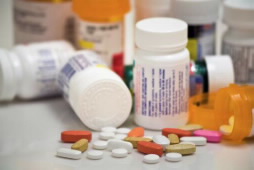FOR IMMEDIATE RELEASE
ACS News Service Weekly PressPac: May 16, 2012
Trashing old, unused medications best for reducing environmental impact
“Life Cycle Comparison of Environmental Emissions from Unused Pharmaceutical Disposal Options”
Environmental Science & Technology
A new study suggests that dumping old or unneeded medications in the trash can may be the best way to reduce the environmental impact of the 200 million pounds of pharmaceuticals that go unused in the U.S. each year. The report, which weighs the emissions from flushing, incinerating or trashing drugs, appears in ACS’ journal Environmental Science & Technology.
Stephen J. Skerlos and colleagues explain that to avoid the risks of abuse and accidental poisoning, as well as other problems that unused, unwanted or expired pharmaceuticals pose, they shouldn’t be kept in homes. If thrown away or flushed down a toilet, however, antibiotics, hormones and other drugs can get into lakes, rivers and other water supplies, where they can affect humans and animals. Some places in the U.S. have recently started take-back programs, in which pharmacies collect unneeded drugs and incinerate them with other medical waste, but this burning and transportation produces greenhouse gases and other pollution. The authors wanted to assess the different disposal methods to see which might make the most sense for U.S. households.
Their evaluation shows that, on balance, trash disposal may be the best option in the U.S. Flushing unwanted drugs puts more drug compounds into the environment. Incineration of drugs taken back to a pharmacy could significantly reduce releases to the environment, but the authors note that take-back programs often have limited participation and could have major financial costs. A national program could cost $2 billion each year. A national participation rate of 50 percent in a take-back program, considered to be a high level of participation, would reduce releases of drugs by 93 percent, which is only five percent more than 100 percent participation in trash disposal. “Furthermore, since 60 percent of individuals in the U.S. already trash their unused pharmaceuticals, trash disposal is likely to accomplish faster removal of unused pharmaceuticals from households due to higher participation rates and greater convenience,” the authors say.
The authors acknowledge funding from the University of Michigan’s Graham Environmental Sustainability Institute (GESI) and the National Science Foundation.
![]()
Contact
Science Inquiries: Michael Woods, Editor, 202-872-6293
General Inquiries: Michael Bernstein, 202-872-6042


